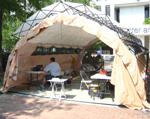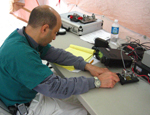Emergency amateur radio team
fine-tunes
communication
by Megan
FinkPublic Relations
It was only two years ago that Hurricane Katrina pounded the Gulf Coast, leaving utter destruction in its wake. When the levees broke, so did the communication system within the city of New Orleans. Infrastructure was gone, 911 service and public safety radio were eliminated, the state of Louisiana’s high-dollar radio system died, and cell phone capabilities were limited. Some people resorted to handwritten messages, which were placed in bottles and dropped from helicopters to the ground, according to Louisiana State Senator Robert Barham. Amateur radio provided one of the few remaining communication systems during and after the hurricane.
 The Hospital
Emergency Amateur Radio Team sets up a disaster tent and communication
equipment for the annual field day exercise held last month outside the
ER behind the health science library.
The Hospital
Emergency Amateur Radio Team sets up a disaster tent and communication
equipment for the annual field day exercise held last month outside the
ER behind the health science library. A resulting lesson from Katrina is the need for a reliable communication system among first responders, emergency management agencies and local hospitals during disasters. Amateur radio, also known as “ham” radio, is an independent communication system created and maintained by federally-licensed volunteers. Dozens of MUSC faculty members and staff are licensed to carry these hand-held devices and manage the additional equipment owned by the hospital as a result of a federal grant. The Hospital Emergency Amateur Radio Team (HEART) participated in an annual field exercise in late June that tested capabilities and operations under conditions similar to a catastrophic event like a hurricane, earthquake or tsunami.
“If we have damaged infrastructure, we have to rebuild; but we also need some basic communication,” said drill participant John Welton, Ph.D., R.N., associate professor, College of Nursing.
 Dr. Steven Saef,
Emergency Medicine, operates the Morse code key to send out emergency
signals during the communication exercise.
Dr. Steven Saef,
Emergency Medicine, operates the Morse code key to send out emergency
signals during the communication exercise.Ham radio operators also use different modes and frequencies and have access to a wider range of service than Citizens Band (CB) radios that can be purchased at local hardware stores. In addition to hand-held devices, two radio repeaters are positioned on top of Rutledge Tower to extend the reach of broadcasts to other HEART members throughout the state.
In the event repeater antennas become damaged by high winds, the team also tested a high-frequency radio that would function as a reserve communication system, connecting MUSC with other regional and national personnel. This temporary set-up includes a long wire strung high across two nearby trees, which is only done when all other means of communication have failed.
“Amateur radio is a ‘safety net’ for existing public safety radio systems when they become overwhelmed or damaged. MUSC and other area hospitals now have the capability to communicate locally and throughout the state,” said Welton.
The “Field Day” was considered a success, especially the coordination and participation of campus volunteers. The communication exercise was part of an overall disaster drill in which tents were erected near the emergency room and behind the health science library. This spacious working condition provided proximity to patient care, which would be beneficial during recovery efforts.
“We set up the tents; we set up the wire in the trees,” said Welton. “It isn’t pretty, but it works.”
Though the simulation identified several strengths, concerns remain regarding the ability to maintain electricity for communication and the availability of operators. A small number of portable generators are available on campus, and the team is looking into the use of solar power as an alternative energy source, because it could support the entire communication effort during an emergency. The presence of radio operators depends on the type of hazard and the extent of damage. A second component of the grant is to train hospital and other campus personnel to get their amateur radio license. Amateur radio is not meant to replace other emergency communication systems; rather, it is simply another viable option that’s cost-effective and highly successful.
For more information on how to obtain a “ham” radio license, or already licensed operators wanting to join the MUSC HEART program, contact Welton at weltonj@musc.edu or Brian Fletcher, R.N., Clinical Services Disaster Preparedness coordinator at the hospital (fletche@musc.edu).
Friday, July 20, 2007
Catalyst Online is published weekly,
updated
as needed and improved from time to time by the MUSC Office of Public
Relations
for the faculty, employees and students of the Medical University of
South
Carolina. Catalyst Online editor, Kim Draughn, can be reached at
792-4107
or by email, catalyst@musc.edu. Editorial copy can be submitted to
Catalyst
Online and to The Catalyst in print by fax, 792-6723, or by email to
catalyst@musc.edu. To place an ad in The Catalyst hardcopy, call Island
Publications at 849-1778, ext. 201.